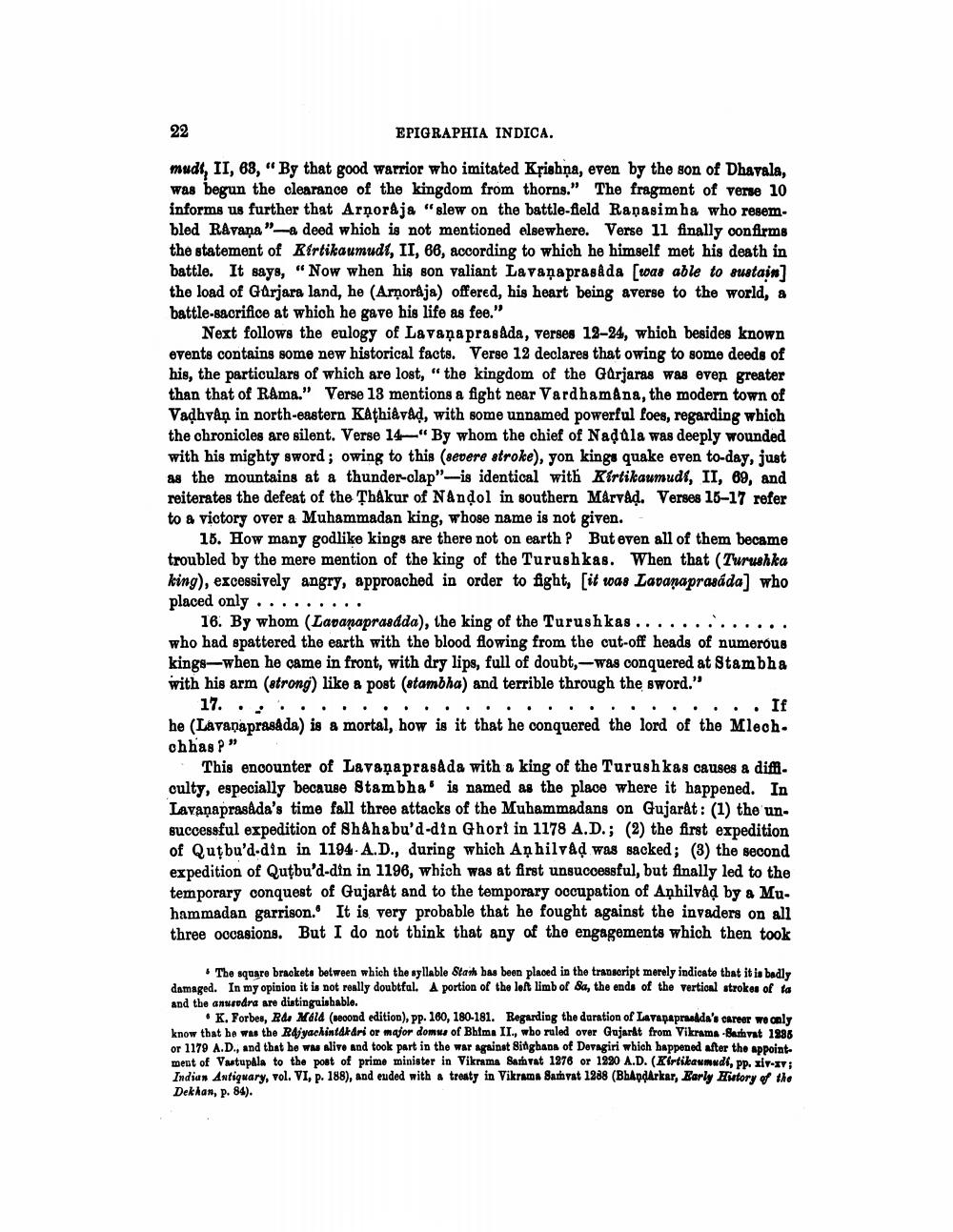________________
22
EPIGRAPHIA INDICA.
mudt, II, 68, "By that good warrior who imitated Krishna, even by the son of Dhavala, was begun the clearance of the kingdom from thorns." The fragment of verse 10 informs us further that Arnorâja "slew on the battle-field Ranasimha who resembled Ravana"-a deed which is not mentioned elsewhere. Verse 11 finally confirms the statement of Kirtikaumudi, II, 66, according to which he himself met his death in battle. It says, "Now when his son valiant Lavaṇaprasada [was able to sustain] the load of Gurjara land, he (Arnorâja) offered, his heart being averse to the world, a battle-sacrifice at which he gave his life as fee."
Next follows the eulogy of Lavana prasada, verses 12-24, which besides known events contains some new historical facts. Verse 12 declares that owing to some deeds of his, the particulars of which are lost, "the kingdom of the Gurjaras was even greater than that of Rama." Verse 13 mentions a fight near Vardhamâna, the modern town of Vaḍhvan in north-eastern Kathiavad, with some unnamed powerful foes, regarding which the chronicles are silent. Verse 14-" By whom the chief of Naḍula was deeply wounded with his mighty sword; owing to this (severe stroke), yon kings quake even to-day, just as the mountains at a thunder-clap"-is identical with Kirtikaumudi, II, 69, and reiterates the defeat of the Thakur of Nandol in southern Mårvåḍ. Verses 15-17 refer to a victory over a Muhammadan king, whose name is not given.
15. How many godlike kings are there not on earth? But even all of them became troubled by the mere mention of the king of the Turushkas. When that (Turushka king), excessively angry, approached in order to fight, [it was Lavapaprasida] who placed only ...
16. By whom (Lavanaprasdda), the king of the Turushkas.... who had spattered the earth with the blood flowing from the cut-off heads of numerous kings-when he came in front, with dry lips, full of doubt,-was conquered at Stambha with his arm (strong) like a post (stambha) and terrible through the sword."
17...
. If he (Lavanaprasada) is a mortal, how is it that he conquered the lord of the Mlechchhas ?"
This encounter of Lavanaprasada with a king of the Turushkas causes a diffi. culty, especially because Stambha is named as the place where it happened. In Lavanaprasada's time fall three attacks of the Muhammadans on Gujarat: (1) the unsuccessful expedition of Shahabu'd-din Ghori in 1178 A.D.; (2) the first expedition of Qutbu'd-din in 1194 A.D., during which An hilvâd was sacked; (3) the second expedition of Qutbu'd-din in 1196, which was at first unsuccessful, but finally led to the temporary conquest of Gujarat and to the temporary occupation of Anhilvâd by a Muhammadan garrison. It is very probable that he fought against the invaders on all three occasions. But I do not think that any of the engagements which then took
The square brackets between which the syllable Stam has been placed in the transcript merely indicate that it is badly damaged. In my opinion it is not really doubtful. A portion of the left limb of Sa, the ends of the vertical strokes of ta and the anusedra are distinguishable.
K. Forbes, Rás Máld (second edition), pp. 160, 180-181. Regarding the duration of Lavapaprasada's career we only know that he was the Rajyachintákári or major domus of Bhima II., who ruled over Gujarat from Vikrama-Samvat 1235 or 1179 A.D., and that he was alive and took part in the war against Singhans of Devagiri which happened after the appointment of Vastupala to the post of prime minister in Vikrama Samvat 1276 or 1220 A.D. (Kirtikaumudi, pp. xiv-zv; Indian Antiquary, vol. VI, p. 188), and ended with a treaty in Vikrama Samvat 1288 (Bhandarkar, Early History of the
Dekhan, p. 84).




